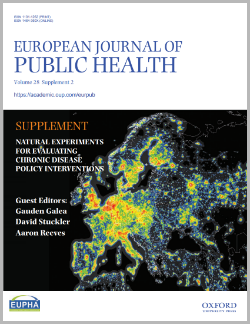Natural experiments – building capacity for high-quality evaluations of public health interventions

European Journal of Public Health
A series of natural experiment studies, conducted by WHO/Europe and presented in a newly published supplement of the European Journal of Public Health (EJPH), are among the first to use new, more robust techniques to evaluate the impacts of national policy and public health interventions on the prevention and control of noncommunicable diseases (NCDs).
Natural experiments are those events where an observer or researcher does not have control of the event. Most public health interventions, such as the implementation of tobacco control policies, can be considered a natural experiment.
Traditionally, public health interventions including those aimed at preventing and controlling NCDs have suffered from a lack of high-quality and influential evaluation, making it difficult to build the case for investment and to learn best about what works to improve population health.
The studies were developed with research teams nominated by ministries of health – using pragmatic approaches to natural experiment studies, they evaluated public health interventions to prevent chronic diseases. This exercise aims to help build a capacity and culture for better and more influential public health evidence.
The studies in this series
WHO/Europe worked with a number of national research teams to develop natural experiment studies looking at national interventions for the prevention and control of NCDs.
The EJPH supplement presents 4 studies:
- Austria – Impact on cardiovascular disease of the 2009 law regulating the trans fatty acids content in foods;
- Romania – Subnational variation in impact of the large tobacco tax increases in 2009 and 2010 to test for the influence of illicit tobacco trade;
- Russia – Impact on cardiovascular disease of the comprehensive and large-scale tobacco control law implemented in 2013;
- Turkey – Changes in political discourse associated with changes in the long-term trend of tobacco consumption between 1960 and 2016.
The project was made possible through support from the Government of the Russian Federation through the WHO European Office for the Prevention and Control of NCDs and the Government of Turkmenistan.



